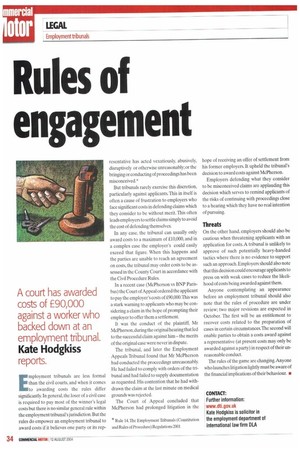Rules of engagement
Page 34

If you've noticed an error in this article please click here to report it so we can fix it.
A court has awarded costs of £90,000 against a worker who backed down at an employment tribunal.
Kate Hodgkiss reports.
Employment tribunals are less formal than the civil courts, and when it comes to awarding costs the rules differ significantly. In general, the loser of a civil case is required to pay most of the winner's legal costs but there is no similar general rule within the employment tribunal's jurisdiction. But the rules do empower an employment tribunal to award costs if it believes one party or its rep resentative has acted vexatiously, abusively, disruptively or otherwise unreasonably; or the bringing or conducting of proceedings has been misconceived.* But tribunals rarely exercise this discretion, particularly against applicants. This in itself is often a cause of frustration to employers who face significant costs in defending claims which they consider to be without merit. This often leads employers to settle claims simply to avoid the cost of defending themselves.
In any case, the tribunal can usually only award costs to a maximum of E10,000, and in a complex case the employer's could easily exceed that figure. When this happens and the parties are unable to reach an agreement on costs, the tribunal may order costs to be assessed in the County Court in accordance with the Civil Procedure Rules.
In a recent case (McPherson vs BNP Parisbas) the Court of Appeal ordered the applicant to pay the employer's costs of £90,000. This was a stark warning to applicants who may be considering a claim in the hope of prompting their employer to offer them a settlement.
It was the conduct of the plaintiff, Mr McPherson, during the original hearing that led to the successful claim against him — the merits of the original case were never in dispute.
The tribunal, and later the Employment Appeals Tribunal found that Mr McPherson had conducted the proceedings unreasonably. He had failed to comply with orders of the tribunal and had failed to supply documentation as requested. His contention that he had withdrawn the claim at the last minute on medical grounds was rejected.
The Court of Appeal concluded that McPherson had prolonged litigation in the hope of receiving an offer of settlement from his former employers. It upheld the tribunal's decision to award costs against McPherson.
Employers defending what they consider to be misconceived claims are applauding this decision which serves to remind applicants of the risks of continuing with proceedings close to a hearing which they have no real intention of pursuing.
Threats On the other hand, employers should also be cautious when threatening applicants with an application for costs. A tribunal is unlikely to approve of such potentially heavy-handed tactics where there is no evidence to support such an approach. Employers should also note that this decision could encourage applicants to press on with weak cases to reduce the likelihood of costs being awarded against them.
Anyone contemplating an appearance before an employment tribunal should also note that the rules of procedure are under review; two major revisions are expected in October. The first will be an entitlement to recover costs related to the preparation of cases in certain circumstances. The second will enable parties to obtain a costs award against a representative (at present costs may only be awarded against a party) in respect of their unreasonable conduct.
The rules of the game are changing. Anyone who launches litigation lightly must be aware of the financial implications of their behaviour. •
























































































































































































